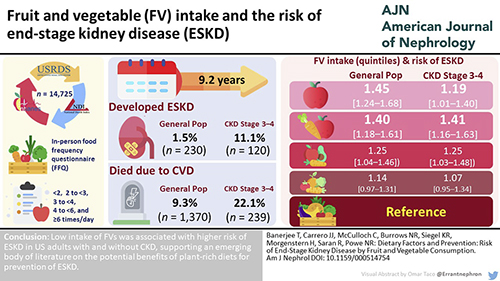Eating Fruits and Vegetables Lowers Kidney Failure Risk
Low intake of fruits and vegetables is associated with a higher risk of kidney failure in US adults with and without chronic kidney disease (CKD), according to a recent CDC study in the American Journal of Nephrology. This result is consistent with other findings that plant-rich diets can help prevent kidney failure or end-stage kidney disease.
Data were analyzed from the 1988–1994 National Health and Nutrition Examination Survey (NHANES) linked to the US Renal Data System (USRDS). NHANES combines interviews and physical exams to assess the health and nutritional status of US adults and children. USRDS is the national data registry of the US population being treated for kidney failure. The study included 14,725 adults aged 20 years or older who were followed up for kidney failure through 2008. During follow-up, 230 (1.5%) participants developed kidney failure.
In the general US population, compared to adults with the highest fruit and vegetable intake, adults with the lowest intake had the highest risk of developing kidney failure:
- Less than 2 servings per day: 45% increased risk.
- 2 to less than 3 servings per day: 40% increased risk.
- 3 to less than 4 servings per day: 25% increased risk.
- 4 to less than 6 servings per day: 14% increased risk.
A similar association was seen in people with stage 3 or 4 (moderate to severe) CKD.

People with CKD are advised to meet with a dietitian to create a kidney-healthy eating plan that is low in salt and fat and has the right amount and type of protein. However, as kidney disease gets worse, the plan may be adjusted to reduce fruit and vegetable intake to limit phosphorus and potassium. Learn more about how CKD can be prevented and managed.
- Dietary Factors and Prevention: Risk of End-Stage Kidney Disease by Fruit and Vegetable Consumption
- Live Well With Chronic Kidney Disease
- Diabetes and Kidney Disease: What to Eat?
- Plant-Based Diet and Kidney Health
- People with CKD Can Lower Their Risk for Kidney Failure
- Chronic Kidney Disease Surveillance System
- Chronic Kidney Disease Initiative
- Division of Diabetes Translation